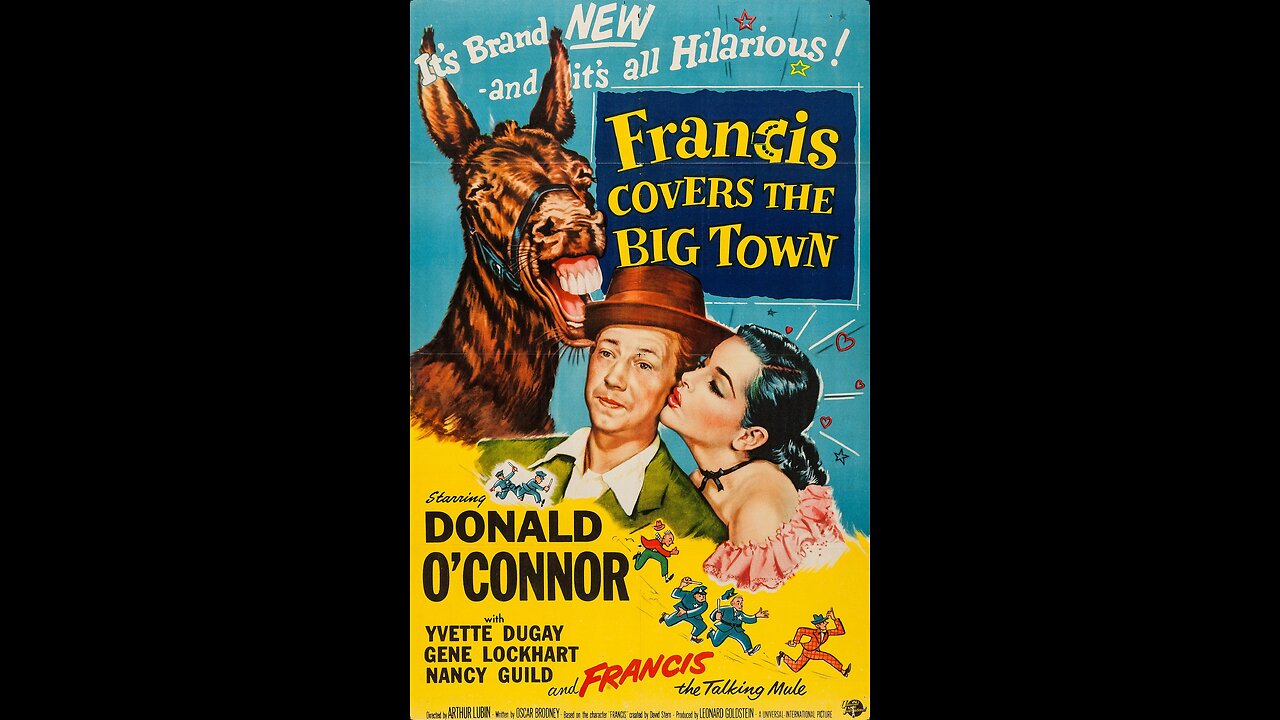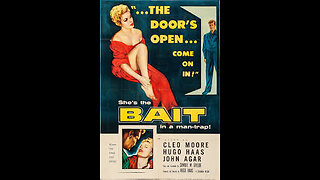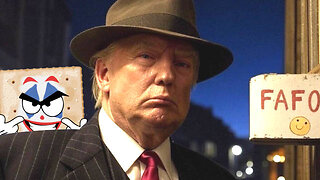Premium Only Content

Francis Covers the Big Town (1953) | American black-and-white comedy film directed by Arthur Lubin
"Francis Covers the Big Town" is a 1953 American black-and-white comedy film directed by Arthur Lubin. It is the fourth installment in the popular "Francis the Talking Mule" film series. The series is known for its comedic elements, centered around the character of Francis, a talking mule.
The film follows the adventures of Francis, a wise-cracking mule with the ability to talk, and his companion Peter Stirling, played by Donald O'Connor. In this installment, Francis and Peter find themselves embroiled in a series of comical misadventures in the bustling environment of a big city.
The story begins with Peter Stirling taking a job as a reporter for a newspaper in the city. Naturally, Francis accompanies him, and the duo gets involved in various escapades as they navigate the challenges of urban life. The talking mule's antics add a layer of humor to the film, as he provides witty commentary and humorous insights into the situations they encounter.
As Peter tries to adapt to his new role as a reporter, Francis becomes an unexpected sensation, drawing attention and causing a stir wherever they go. The film combines slapstick humor, wordplay, and situational comedy as the duo interacts with the eccentric characters of the big city.
The central plot involves Peter stumbling upon a potential news story or mystery, and with Francis's assistance (and interference), they attempt to uncover the truth. The film plays on the contrast between the seemingly ordinary man and his extraordinary talking mule, creating comedic scenarios that keep the audience entertained.
Donald O'Connor (Peter Stirling): O'Connor brings his comedic talents to the role of the affable and bemused reporter.
Voice of Chill Wills (Francis): Chill Wills provides the voice for Francis, infusing the character with humor and personality.
The "Francis the Talking Mule" series, of which "Francis Covers the Big Town" is a part, gained popularity for its lighthearted and comedic approach. While not necessarily critically acclaimed, the films were well-received by audiences, and the character of Francis became an enduring symbol of whimsical entertainment. The series contributed to the success of Donald O'Connor and added to the tradition of talking animal comedies in Hollywood.
-
 1:19:31
1:19:31
Classic Films & Movies Archive
11 hours agoBait (1954) Directed by Hugo Haas
47 -
 10:05
10:05
DIY Wife
3 years agoHow We Flip Old Furniture For Profit!
70.2K58 -
 2:14:54
2:14:54
TheSaltyCracker
9 hours agoTrump Goes Gangster ReeEEeE Stream 01-26-25
146K301 -
 4:42:13
4:42:13
Due Dissidence
19 hours agoTrump Calls To "CLEAN OUT" Gaza, Swiss ARREST Pro-Palestine Journalist, MAGA's Hollywood Makeover?
66.9K92 -
 2:02:20
2:02:20
Nerdrotic
11 hours ago $19.97 earnedDECLASSIFIED: JFK, MLK UFO Immaculate Constellation Doc | Forbidden Frontier #089
88.3K17 -
 3:00:14
3:00:14
vivafrei
19 hours agoEp. 248: "Bitcoin Jesus" Begs Trump! Rekieta Gets Plea Deal! Pardons, Deportations, Bird Flu & MORE!
206K222 -
 3:44:06
3:44:06
Rising Rhino
18 hours ago $14.24 earnedWashington Commanders Vs Philadelphia Eagles: NFL NFC Championship LIVE Watch Party
97.7K4 -
 13:00
13:00
Exploring With Nug
12 hours ago $7.28 earnedHe Went To Get A Haircut And Vanished WIthout a Trace!
79.3K3 -
 18:53
18:53
DeVory Darkins
2 days ago $33.86 earnedTrump JUST ENDED Mayor Karen Bass During HEATED Meeting
107K224 -
 21:06
21:06
Russell Brand
16 hours agoIT'S COMING
164K569